How do we determine which processor is good and which is not? Obviously, it is not enough to believe just what the salesperson says. Keep in mind that a processor is the most essential component of the system. Therefore, you need more information to make a final decision about your new processor. In this article, we are comparing the Intel Xeon vs i9 line.
Xeon vs i9
You have already heard about Core i9 processors. Whether you want a laptop or PC for gaming or multitasking, the i9 line has a huge selection of powerful processors to offer. On the other hand, Intel has also made the Xeon line, similar to the Core i9, but intended for business workstations and servers.
| Intel Xeon | Core i9 | |
|---|---|---|
| Number of cores | Up to 22 | Up to 18 |
| Max number of threads | 44 | 36 |
| Min clock speed | 1.6 GHz | 1.50 GHz |
| Max clock speed | 3.9 GHz | 5.00 GHz |
| L3 cache memory | 10-15MB | 16-25MB |
| Integrated graphics | – | Intel Iris Xe Graphics |
| Unlocked | No | Yes |
Intel Xeon
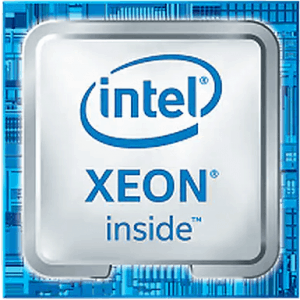
Pros
- More cores
- More threads
- Suitable for businesses
- Great for server configurations
Cons
- Doesn’t have integrated graphics
- Can’t be overclocked
Intel Core i9
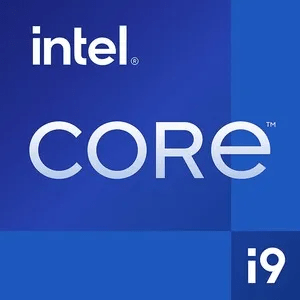
Pros
- Higher maximum speed
- It comes with integrated graphics
- Great for games and 4K videos
- Fewer cores and threads
- Slightly lower base speed
- Unlocked for overclocking
Xeon vs i9 – Which one is better?
Before you choose a processor, you should know what are you going to use it for. You need to know if you are going to use it for gaming, watching movies, video editing, or something else. Based on that, you can set aside the budget for the processor.
Cores
A core is a processor within the processor. Initially, processors had only one core. Today, the situation is completely different. Modern processors can have up to 50 cores. But these are the most expensive ones. The CPU market is full of great processors that have between 8 and 20 cores.
In terms of performance, cores can help you enhance the experience of using your device. For instance, if you have a laptop or PC, equipped with an 8-core processor, you might be able to perform multiple actions at the same time.
To conclude, the more cores you have, the better performance! That is exactly the case with the Intel Xeon line of processors. Some Xeon processors have up to 22 cores. So if you like multitasking, an Intel Xeon processor might be a good solution for you!
Winner: Intel Xeon
Clock Speed
While the number of cores determines how many operations a processor can do per second, the clock speed shows how fast operations can be performed. In other words, the clock speed represents the maximum number of operations in one second!
We use gigahertz to show the processor speed. Simply put, the higher the number, the higher the speed.
Among all indicators, it might be a good idea to consider the speed when choosing a processor. When you read the specifications, you might notice two types of speed – a base clock speed and max turbo frequency.
The base clock speed is a minimum speed while the max turbo frequency represents the maximum speed of an Intel processor. A processor activates the max turbo frequency when it is under heavy load. So if you are running high-demanding applications or games, your processor will probably activate this mechanism.
When it comes to a base clock speed, we don’t have a winner in this Xeon vs i9 comparison. The processors have almost the same minimum speed that is around 1.5 GHz. But with a maximum clock speed of 5 GHz, the Core i9 line is a clear winner of this segment!
Winner: Core i9
Threads
Each physical core on a processor can be divided into virtual cores. These virtual cores are called threads. More threads mean better performance. For example, if you have a dual-core processor and a thread on each core, it will behave as if it has 4 cores.
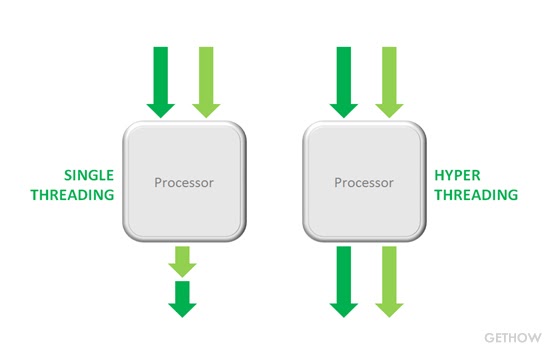
Simply put, each of your cores works like two “logical cores”. In this case, the processor can handle tasks more efficiently. So if you want to surf the net, play basic video games, or watch movies, you probably won’t get much out of this technology.
On the other hand, if you want to use high-demanding applications for video editing or graphic design, you can experience more benefits from this technology. In this case, the Intel Xeon line might be a better solution for you as it contains 44-thread processors.
Winner: Intel Xeon
Socket
Different processors require different types of sockets. If you already own a motherboard and don’t want to replace it, you need to purchase a processor that matches the socket of the motherboard. Alternatively, you need to make sure that the motherboard you are buying is compatible with your new processor.
In recent years, Intel hasn’t always ensured compatibility between its new chips and older motherboards. This happens even if the socket is practically the same. For example, Intel’s LGA 1150 and 1151 sockets are only different by a single pin.
So before you buy a new processor, read the specifications and make sure the processor you want to buy is compatible with the socket on your motherboard.
Cache
Cache memory makes the communication between CPU and RAM more efficient.
RAM (Random Access Memory) is a memory where all programs store their data. When you turn on your computer and open a specific program, the program loads its data into RAM. But after you turn off the computer, RAM loses the data. Keep in mind that RAM is a temporary memory.
Cache memory is located on the processor. It stores information about the most commonly used applications. Once you turn on your computer, the processor first checks its cache and then moves to RAM. Compared to RAM, cache memory is much faster but it has a small capacity.
However, you shouldn’t pay too much attention to the size of the cache memory. It is quite difficult to estimate the system performance by using cache memory numbers. There are more important factors to consider.
When it comes to this Intel Xeon vs i9 comparison, i9 processors provide higher capacity. On average, they have between 16-25MB per core. Therefore, if you choose a processor from this line, you might experience a slightly better gaming performance.
Winner: Core i9
Integrated graphics
Among all components, the motherboard contains a component called integrated graphics. It can’t be removed from the motherboard and it doesn’t have its own memory. Instead, it shares system memory along with the processor.
Although the integrated graphics are weaker compared to graphics cards, it consumes less power and creates less heat. Because of that, it is suitable for laptops. For instance, if you want to have a business laptop, it might be a good decision to buy one with integrated graphics.
At the same time, there are discrete graphics cards. We install them on the motherboard as additional components to increase the system’s performance.
If you are a graphic designer, programmer, or video editor, you might need a configuration equipped with a graphics card. In this case, you should be aware that they consume more energy and produce more heat.
Intel i9 processors usually come with Intel Iris Xe Graphics. Newer i9 processors come with Iris Xe graphics, while older ones have either Intel UHD Graphics 630 or Intel UHD Graphics 750.
All these integrated solutions support DirectX 12. Therefore, combined with a good configuration and a decent amount of RAM, you can enjoy playing games. You can also watch 4K movies, and use high-intensity apps.
However, Intel Xeon models don’t have integrated graphics.
Winner: Core i9
Ram compatibility
RAM stores data that the CPU is currently using or is planning to use soon. To determine compatibility between RAM and a particular processor, you need to know more details about your motherboard.
Keep in mind that you need to make sure everything is compatible when choosing a processor. You don’t need to open up your computer to find out the names of your components. Instead, use the Windows task manager or other specialized software that can help you get all the relevant information about your system components.
When it comes to RAM compatibility, check out the following things.
Firstly, determine the type of RAM. RAM is usually expressed as DDR and a number after that. You can read the motherboard specifications to find out what type of RAM it supports. It is usually DDD4 or DDR3.
Secondly, check out how many DIMM slots your motherboard has and what the maximum amount of memory it supports. At some point, you might want to add more memory to your system. So you need to make sure you have enough memory slots in order to increase the amount of memory on your system.
Last but not least, all your memory modules should be identical. Make sure the speed of the RAM (frequency), capacity, and latency are the same for all memory sticks you want to buy. If you want to upgrade the system, it might be a good idea to check what RAM is already installed and invest in the same modules.
Intel Xeon processors support DDR4 memory. The most common speeds are 1866, 2133, and 2400 MHz. Depending on the model, Intel Core i7 models support DDR4-2666, DDR4-2933, DDR4-3200, and DDR5-4800.
Winner: Core i9
TDP
TDP is the maximum amount of heat generated by the chip and measured in watts. For example, an Intel Core i9 processor has a TDP of 95 watts. You need to make sure you have a CPU cooler that can withstand that amount of heat and a power supply that can provide enough power.
Keep in mind that processors significantly increase heat if they are overclocked. It is always good to know what your TDP is so you can buy the right cooling system and power supply equipment.
Unique features
Overclocking
Overclocking forces the CPU to maximum limits above its factory values. If you want to overclock the CPU, it has to be unlocked. Intel Xeon processors are locked for overclocking. However, if you are a tech enthusiast who likes to experiment with CPU speeds, you can invest in an Intel Core i9 processor.
Since higher overclocked speeds generate more heat, you will need to spend more time improving your cooling system. This is because you need to protect the CPU and the motherboard from damage. Most importantly, you need to know how to do this properly. Otherwise, you can damage the CPU or shorten its lifespan.
Fan/cooling
When it comes to cooling systems, you have two solutions, an integrated cooling system or a separate cooler. The integrated cooling system is cost-effective and compatible with the processor you want to buy.
However, if you want to play highly demanding games or use high-intensity applications, the cooler may become too loud or may not be able to cool the processor. So it might be a good idea to consider buying the processor and cooling system separately.
Example Comparison: Xeon E5-2697 v2 vs Core i9-11900K
Let’s compare two specific models to point out the similarities and differences between the Intel Xeon and Core i9 lines. In this case, we have the Xeon E5-2697 v2 and Core i9-11900K. As you can guess, the Xeon model dominates when it comes to the number of cores and threads. This one has 12 cores and 24 threads.
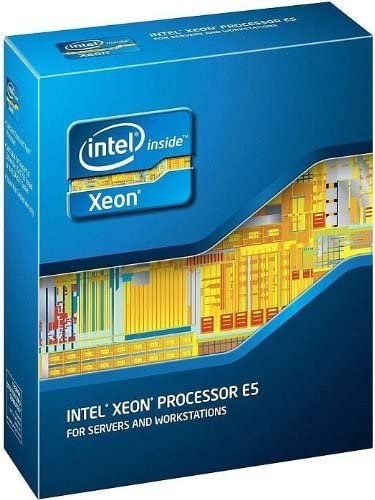
On the other hand, the Core i9 model is much better at speed. It has a base clock speed of 3.5 GHz and a maximum speed of 5.3 GHz. Above all, it has a lower TDP than its competitor – 125 W. So if you are a fan of high clock speeds, this processor might be great for you since it supports overclocking.
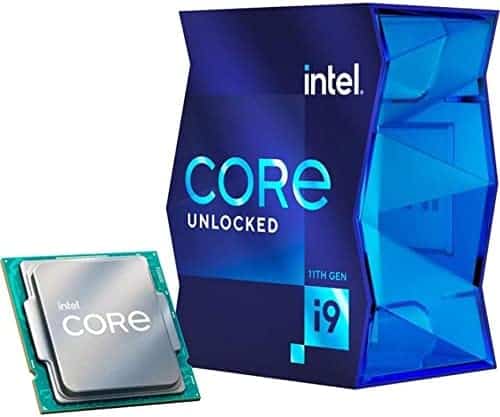
They both have a decent amount of cache. The Xeon model has 30 MB of cache while the Core i9 processor has 16 MB of cache memory. They use the Intel Smart Cache Technology which allows all cores to share access to the last level of cache memory.
To conclude, it is obvious that the Core i9-11900K has a slight advantage over its competitor. The processor is for those who enjoy gaming, watching UHD videos, or using high-demanding applications on desktop computers.
However, because of the high number of cores and threads, the Xeon E5-2697 stands out as a great solution for businesses and people who want to set up a server.
SEE ALSO: Our Xeon vs i7 comparison
Conclusion
Here are the results of this Intel Xeon vs i9 comparison.
Use Intel Xeon if you:
- Like multithreading
- Want to have a business laptop or PC
- Want to set up a server
- Play high-demanding games (a separate graphic card is needed)
Use Core i9 if you:
- Like multitasking
- Use high-demanding apps
- Play the latest video games
- Watch UHD movies
- Would like to overclock the processor
I like this article as I wanted to know the difference and for me I like the i9 I now have a server with Xeon processors 2 of them and it makes a lot of heat and a lot of fans to keep it cool and the server is very heavy so I think I’ll go with the i9 thanks for all the info
ErickGarcia Capricorn Systems R&D Morgan Hill CA
Really glad we were able to help, Erick. The i9 is a solid choice for sure! 🙂